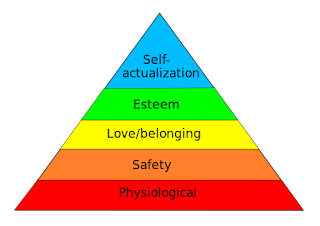Intelligent people learn to adapt to environment,
unintelligent people adapt environment to them
(popular joke)
1. Change the outside
Few people can be happy when basic needs are not met. When you are hungry or in pain it is unlikely that something else would make you happy. Even with the basic needs fulfilled, many people have higher order needs, like being appreciated, achieving their highest potential.
Therefore, a prerequisite of happiness should be to have the necessary means to achieve a satisfactory life, at the full height of the Maslow's hierarchy of needs.
 |
| source: wikipedia.org |
When we are talking about love/belonging, higher education is not anymore a good predictor of success. One could push harder for advancing career and neglect human relations, lose friends and have a bad family life. Self actualization could get some benefit from this, however it is uncertain if a higher degree need can fully compensate for a more basal need that is unfulfilled.
Maybe a balanced life, with all the needs fulfilled at satisfactory level is safer bet than one with some holes at some levels. If you get very sick by pursuing financial security it is not really a good deal...
2. Change the inside
There are people that have great personal achievements, but they are still unhappy. They push themselves for greater and greater goals and never get satisfied. These people are perfectionists, they sometimes have major contributions to the people around, however they are still hungry, still wanting for more...
There are many cases when such people, without proper self reward for their efforts, just gave up and finished their prolific life prematurely.
For such people, it might be even more important to change themselves to be a little more pleased by what they have achieved. Many such people are idealists, they aim for perfection. In some cases there might be a chemical imbalance that prevent them to be happy with what they have.
Anyway, there are various methods aiming to make people more happy with what they have. There are psychological therapies, antidepressant pills, meditation, religious practices. From my limited knowledge, a core message in Buddhism is to reduce the suffering by changing the inside - like to not cling on various desires...
Actually, it might be easier to get happy by changing the subjective perception about the world than by... changing the world. Many people can be very joyful with very little. Wealthy people gets very easy accustomed with what they have and they need more and more in order to obtain the same pleasure.
The risk for happy people that don't worry much is that they can easily go into huge troubles, when even their basic needs are threatened. A good live on the long run requires a little worry about the future...
For a happy life, psychologists recommend many small pleasures and rewards, as opposed to pursuing a huge reward that will come after very much effort. There is a limit of how much joy you can digest from a single experience. It is like being hungry 7 days waiting for a huge meal that is 14 times bigger than you eat in one regular day.
It might be even necessary to go through small periods of shortcomings in order to better appreciate the value of what you have. For sure, some small tricks can help you being happier after you have your basic needs met.
3. Beyond happiness
What if happiness is not the ultimate goal in life? What if this is not the full picture? What if there is one additional criteria that helps to balance the two paths above? To be continued...
Please share this article if you find it interesting. Thank you.

Comments